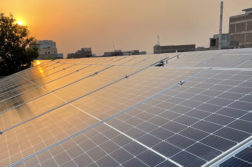As the reaction to the federal budget becomes clearer, it now appears that Wayne Swan’s greatest achievement with it is that he has managed to get both the mining industry and environmental groups offside.
The public position taken by Tim Flannery highlights just how much the environmental movement in particular has lost trust in Rudd’s ability to act on issues. The former Australian of the Year is known for choosing his words carefully, but yesterday he attacked the Prime Minister’s breach of faith with the electorate. Flannery was quoted as saying:
"I could go to the Prime Minister now and say, ‘Look, why don’t we put some policies together to address climate change effectively… And even if he accepted them, I wouldn’t have any faith that he would actually deliver on them because we’ve already seen this breach of faith.’"
The scale of the reaction presents Rudd with another vocal lobby to deal with — one that is just as determined to make itself heard as the miners are. In addition to Flannery, GetUp sent out an action email asking its supporters to do more than simply sign one of those petitions that most of us have grown tired of. In addition, the Australian Conservation Foundation and the Climate Institute — two environmental groups that the Government had managed to herd inside the tent — have now criticised the Government strongly.
With such intense responses by green groups, it seems a very long time ago that Rudd was riding a wave of support from the environmental voter. At that time, Howard was so out of step with the electorate on this one that Rudd easily outmanoeuvred him. This was followed by a quick ratification of the Kyoto Protocol and his now haunting declaration that global warming is the "great moral challenge of our time".
For many who had campaigned on climate action, there was a sense that change was possible — a government had emerged that could at least begin a serious conversation about a post-carbon future. With respect to the environment, Rudd presented us with a mixture of pragmatism, policy and even passion.
Following the budget earlier this week, one thing is certain: Rudd and his Government’s love affair with the environment, and hence the environmental movement, is over. This is not simply a passionless marriage, but a complete breakdown. And it is not just about Rudd’s great moral backflip on the proposed Emissions Trading Scheme, but much deeper.
Given that Rudd got closer than Howard did to pushing through a (seriously flawed) ETS, it may be unfair to liken the two, but the rationale of putting Australia’s short-term economic interest first and refusing to act until the rest of the world sorts itself out is certainly Howard-esque. Further, his refusal to negotiate with the Greens in good faith undermines his claims that he has been stymied by his opponents.
Beyond the headline backflip, what can we tell about Rudd’s position on the environment from this year’s budget? Let’s look at both the domestic and international approach presented by Rudd.
Rather than any significant action on dealing with Australia’s various environmental challenges, be it our heavily carbon-reliant economy or our chronic water problems, the budget announcement of $652 million for renewable energy can best be described as a piecemeal approach. This renewable energy future fund is paid for by the delay of emissions trading to 2013.
Beyond that, there is $490 million for new climate and environment programs — but these are undermined by $550 million in cuts to other climate and environmental programs.
Worse still, it presents little in the way of a strategic direction on what a future Australian economy will look like. The Government is touting its new tax on mining super-profits as a way to fund new infrastructure, but their definition of "new infrastructure" doesn’t appear to involve building a post-carbon future.
The budget’s failure to deal with environmental challenges here is matched by its failures regarding abatement strategies and commitments internationally. While the Government’s decision to increase aid spending to 0.5 per cent of gross national income (GNI) by 2015 attracted support from organisations such as Oxfam Australia, those groups also raised concerns about the fact that climate change is being ignored.
There is no new money allocated to assisting developing countries deal with climate change. Oxfam noted that the stated $350 million commitment in 2012–13 for climate finance is simply maintaining the contribution to Australia’s global climate change responsibility and came from existing aid commitments. This is despite the fact that the UN requested all developed nations to contribute an additional US$30 billion to a "fast-start financing program" for developing countries to both adapt to climate change and reduce their emissions.
If we look further into the figures, this disregard for international assistance on climate change gets worse. According to Aid/Watch, the budget sets aid to assist low-income nations to adapt to climate change at $119 million in 2010–11, and $159 million in 2011–12. Those figures include the bilateral International Climate Change Adaptation Initiative.
But compare that to the amount that the World Bank has said is needed. The bank’s "Economics of Adaptation to Climate Change Study" published in the lead-up to Copenhagen, found that the amount needed to assist low-income nations to deal with climate change adaptation is somewhere in the order of $75–100 billion per annum. As Aid/Watch noted, the $119 million next year is 0.0016 per cent of the minimum $75 billion — much below what you’d expect from a government that claims to take climate change seriously.
Greens senator Christine Milne noted that this means that Rudd’s credibility on the issue internationally will be questioned. It’s also likely to mean that our Pacific Island neighbours are likely to trust Australia that little bit less. (There’s that "trust" theme again for Rudd.)
It shouldn’t take Australia’s Chief Scientist, Professor Penny Sackett to point out — as she did last week — that we can’t deal with climate change by not acting. Delays in action will merely cost more down the track — something that Kevin Rudd seems to have neatly forgotten. As Sackett noted:
"It is clear that now is the time for action on climate change, and yet we are not acting with sufficient speed to reduce the large degree of risk that climate change poses to our health, our environment and our livelihoods."
There is no doubt that Australia will be impacted by climate change. We also know that those who will be at the frontline are the poorest nations — those who can least afford to act.
To make matters worse, despite all the whining of the mining industry about the tax on their super profits, Rudd has maintained the billions of dollars of subsidies to the mining industry. From the 38-cents-a-litre rebate to the direct tax breaks on exploration and equipment.
So, how should we feel about this budget? It all depends if you think that tens of thousands of scientists have got it wrong and a handful of media savvy climate sceptics have got it right. It’s sad to think that we are likely to get even less from a government under Tony Abbott — although we could expect him to at least bring a refreshing lack of hypocrisy to the issue.
Donate To New Matilda
New Matilda is a small, independent media outlet. We survive through reader contributions, and never losing a lawsuit. If you got something from this article, giving something back helps us to continue speaking truth to power. Every little bit counts.



